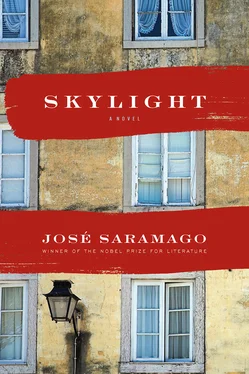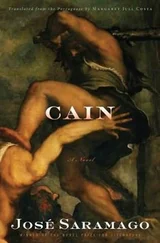“Who?”
“The cobbler. A young man this time, a very badly dressed one too.”
“Oh well, birds of a feather…”
This was one of Anselmo’s favorite sayings, indicating that one should hardly be surprised to find one ragamuffin living with another ragamuffin. However, what he said next was related to that other matter:
“We could do with a lodger here.”
“If we had the room.”
Since they didn’t have the room, Anselmo was able to say:
“Oh, it was just an idea. I wouldn’t really want to have an interloper living here…”
There were three short, sharp rings on the doorbell.
“That’ll be Claudinha,” said Anselmo. He glanced at the clock and added: “She’s late.”
When Maria Cláudia came in, the gloomy shadows in the kitchen got up and left. She was like the colorful cover of an American magazine, of the kind that prove to the world that in America no one and nothing is photographed without first being given a quick lick of paint. Maria Cláudia had unerring taste when it came to choosing the colors that best set off her youthful beauty. Presented with two similar tones, she would unhesitatingly, almost instinctively, choose the one that suited her best. The result was dazzling. Anselmo and Rosália — glum, dull-complexioned creatures dressed in somber outfits — could never resist that influx of freshness. And while they could not imitate her, they could admire her.
With the sixth sense of the incipient actress, she stood before her parents just long enough to seduce them with her elegance. She knew she was late, but didn’t want to have to explain why. At just the right moment, she ran over to her father like a graceful bird and kissed him on the cheek. Then she spun around and fell into her mother’s arms. As actors in the comedy of mistaken identities that was their life, all of this seemed so natural that neither of them even thought to express surprise.
“I am so hungry!” said Maria Cláudia, and without waiting, and still wearing her raincoat, she ran into her room.
“Take your coat off in here, Claudinha,” said her mother. “You’ll get everything wet.”
No answer came, not that she had expected one. She made these observations and remarks without the faintest hope of her daughter paying any attention, but the mere fact of saying them gave her the illusion of maternal authority and chimed with her idea of how one should bring up one’s children. And that authority remained undented despite the many defeats it suffered.
Anselmo’s smug expression suddenly darkened. A flicker of distrust appeared in his eyes.
“Go and see what she’s up to in there,” he told his wife.
Rosália duly went and found her daughter peering down at the street from behind the curtains. Hearing her mother come in, Maria Cláudia turned, wearing a smile that was half impudent, half embarrassed.
“What are you doing? Why haven’t you taken off your coat?”
Rosália went over to the window and opened it. Out in the street, immediately opposite, a boy was standing in the rain. She slammed the window shut and was about to tell her daughter off, but met with a pair of cold eyes, eyes that seemed to glitter with malice and rancor. She felt afraid. Maria Cláudia unhurriedly took off her raincoat. A few drops of water had made a wet patch on the rug.
“Didn’t I tell you to take off your coat outside? Look at the state of this rug!”
Anselmo appeared at the door. Feeling safer in company, his wife burst out:
“The reason this young madam rushed in here was so she could stand at the window and see some foolish boy watching out there in the street. He probably walked her home, that’s why she was late!”
Proceeding slowly across the room as if he were onstage and obeying the director’s instructions, Anselmo went over to his daughter. Claudinha was standing with eyes downcast, but nothing about her indicated any shame or embarrassment. Her calm demeanor seemed almost to repel. Her father, however, was too interested in what he was about to say to notice this.
“Now, Claudinha, you know perfectly well that this simply won’t do. A young girl like you can’t be seen walking the streets with a young man. What will the neighbors say? They have poisonous tongues, you know. Besides, such friendships never come to anything and can only compromise you. Who is the boy anyway?”
Silence from Maria Cláudia. Rosália, although seething with indignation, also said nothing. Confident of the dramatic effect his gesture would have, Anselmo placed one hand on his daughter’s shoulder and went on in a slightly tremulous voice:
“You know we love you and only want what’s best for you. You shouldn’t be chasing after some insignificant young lad. There’s no future in it. Do you understand?”
The girl looked up, made as if to free her shoulder from his hand and said:
“Yes, Papa.”
Anselmo rejoiced; his pedagogical method never failed.
And so it was that, filled with this conviction, he left the house, protected from the increasingly heavy downpour and determined now to insist on being given an advance on his wages. The faltering domestic economy demanded it, and he, in his role as husband and father, deserved it.
Reclining on two pillows and still somewhat drugged with sleep, Caetano Cunha was waiting for his lunch. The light from the bedside lamp left half his face in darkness and emphasized the ruddy glow of his illuminated cheek. With a cigarette in one corner of his mouth, one eye half closed against the smoke, he looked like a villain from a gangster film whom the scriptwriter had abandoned in the inner room of some sinister house. To his right, on the dresser, the photograph of a little girl was smiling at him with unnerving concentration.
Caetano was not looking at the photo, therefore his smile had nothing to do with his daughter’s. The smile in the photo bore no resemblance to his. The one in the photo was open and happy, and it was only its fixed quality that made one uneasy. Caetano’s smile was lubricious, almost repellent. When grownups smile like that, they should not do so in the presence of children’s smiles, even smiles in photographs.
After leaving work, Caetano had had a little “adventure,” a sordid adventure — the kind he liked best. That’s why he was smiling. He enjoyed the good things of life and enjoyed them twice over, once when he was experiencing them and again in retrospect.
Justina came in at that point and spoiled the second part of his pleasure. She entered carrying the lunch tray and placed it on her husband’s lap. Caetano stared at her mockingly, his eyes bright. The lampshade was red and so the whites of his eyes glowed bloodily, reinforcing the malice in his gaze.
Justina was oblivious to his stare, just as she was to the fixity of her daughter’s smile, having grown used to both. She returned to the kitchen, where a frugal, insipid, diabetic lunch awaited her. She ate alone. Her husband was never there for supper, except on Tuesdays, his day off; and at lunch they ate separately, he in bed and she in the kitchen.
The cat leapt up from his cushion beside the fireplace, where he had lain dreaming and drowsing. He arched his back and, tail aloft, rubbed against Justina’s legs. Caetano called to him. The cat jumped onto the bed and stared at his owner, slowly twitching his tail. His green eyes, unaffected by the red light, were fixed on the plates of food on the tray. He was waiting for his friendliness to be rewarded. He knew perfectly well that the only thing he ever got from Caetano were beatings, but he nonetheless persisted. Perhaps in his cat brain he was curious to find out when, if ever, his owner would tire of hitting him. Caetano was not tired yet: he picked up a slipper and threw it. The cat was quicker than he and escaped in one bound. Caetano laughed.
Читать дальше












